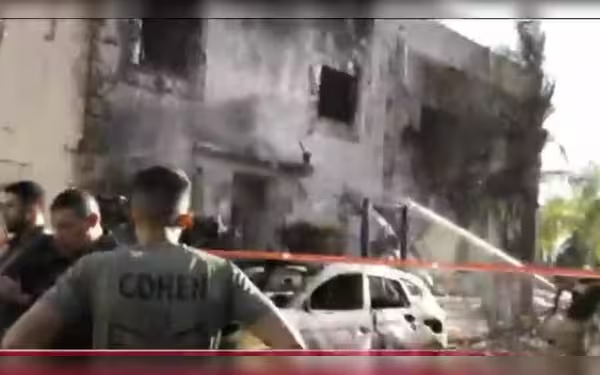Saturday, November 16, 2024 07:29 PM
Netanyahu Declares Military Action Against Hezbollah
- Netanyahu claims Israel struck Hezbollah significantly.
- Tensions escalate along Israel-Lebanon border.
- Civilians face dangers amid ongoing conflict.
 Image Credits: france24
Image Credits: france24Netanyahu announces Israel's military strikes on Hezbollah amid escalating tensions along the Israel-Lebanon border.
In recent days, tensions between Israel and Hezbollah have escalated significantly, leading to a series of confrontations along the Israel-Lebanon border. Israeli Prime Minister Benjamin Netanyahu announced on Sunday that Israel had "landed a series of blows on Hezbollah," indicating a strong military response to the ongoing conflict. This statement comes after a night filled with intense cross-border fire, marking a critical moment in the long-standing rivalry between the two entities.
The conflict with Hezbollah, a militant group based in Lebanon, has deep historical roots, often tied to broader regional issues involving Iran and Syria. Over the years, Hezbollah has been involved in numerous skirmishes with Israel, and the recent flare-up is a reminder of the fragile peace that exists in the region. Netanyahu's comments suggest that Israel is taking a proactive stance in defending its borders and responding to perceived threats.
As the situation unfolds, it is essential to understand the implications of these military actions. The ongoing violence not only affects the immediate areas involved but also has the potential to destabilize the broader Middle East. Civilians in both Israel and Lebanon are caught in the crossfire, facing the harsh realities of war. The international community watches closely, as any escalation could lead to a larger conflict.
The recent statements by Netanyahu highlight the seriousness of the situation and the ongoing struggle for security in the region. As both sides prepare for potential further confrontations, it is crucial for leaders to seek diplomatic solutions to prevent further loss of life and to restore peace. The hope remains that dialogue can prevail over violence, allowing for a more stable future for both Israelis and Lebanese.













